
What could Pakistani and Chinese military officials discuss as far as the issues related to “Changing Geo-Strategic Environment” are concerned, in their meeting in Moscow on the sidelines of a conference of Defense officials of Shangai Cooperation Organization (SCO)? Possibly changes in the India-Pakistan military equation? But no discernible changes have taken place in the region in the military balance or the geo-political and geo-strategic environment between two of these two South Asian Nuclear rivals. What other geo-strategic changes—mentioned in the official press release about meeting between Pakistan’s Chairman Joint Chiefs of Staff committee, General Nadeem Raza and General Wei Fenghe, China's Minister of National Defense— are taking place around us?
“Matters related to changing geostrategic environment and further strengthening of security and defence cooperation between the two countries were discussed during the meeting” is how the official Press Release of the ISPR described the bilateral meeting and delegation level talks between the military delegations of China and Pakistan in Moscow, where they were attending the conference of military officials of members countries of Shangai Cooperation Organization (SCO).
The answer to the question raised in the above paragraph is simple: The world is fast moving into a strategic environment where two powerful and rival countries—United States and China— or two competing blocks of countries would be confronting each other at the world stage. United States is the existing power or the status quo power, whereas China is a rising power or a country which will soon acquire enough military and economic capacity to challenge the international status quo.
Most international experts agree that a conflict between the existing and rising powers is inevitable. China is not simply a rising power it is a country which will soon surpass America as the biggest economy in the world. Some even say Washington is in relative decline. Consider this: United States and its treaty allies accounted for 70 percent of the global GDP and military spending in 1994, but in 2015 this figure declined to 60 percent. Whereas, China accounted for 3.3 of global GDP in 1994, and 2,2 percent of military spending. Now it’s GDP has risen to 11.8 percent of the global GDP and 12.3 percent of the world military spending.
The gap is still wide but Chinese political ambitions seems to have outgrown its relative economic and military strength—In 2013 Chinese leadership initiated the Belt and Road Initiative (BRI), which has been described by many international experts as part of Chinese ambitious plan to replace American led and American designed international system that was painstaking constructed at the conclusion of Second World War.
The Forum of Shangai Cooperation Organization (SCO) itself is part of Chinese plans to build Sino—centric regional system of states that would rival international institutions built and led by Western world or simply United States of America. China is on the path to built economic and political structures that could rival American power at the international stage.
Pakistan has been given a place of pride in the two above mentioned institutions. First, we have CPEC in Pakistan which is part of Chinese ambitious plan to establish a communication network encompassing more than 50 countries on three continents. Secondly, China ensured Pakistan’s membership of SCO and a crucial role for it as country which possessed vast experience in counter-terrorism and counter-insurgency—both these capabilities are greatly valued in the member countries of SCO, where insurgencies and terrorism are rampant.
But the question is how this changing geo strategic environment is relevant to Pakistan—that created the necessity for senior military officials of China and Pakistan to discuss it in a third country? Firstly, it is relevant to us because soon Pakistan would be confronted with the strategic choice of opting completely out of its decades’ old strategic alliance with Washington and the western world. This may assume urgency as the competition between existing and rising power heats up. Secondly, this changing geo-strategic environment has forced its arch-rival India into a deep embrace with its erstwhile ally, Washington. There are very strong lobbies in Washington who see India as a counter to rise of China on the world stage and they are hell bent to use New Delhi against Beijing. As Pakistani political and military elite has a habit of viewing the outside world from the prism of their anti-India feelings, it is obvious what would be Pakistan’s reaction to this “deep embrace”.
How Pakistan state and its political and military elite will adjust to this changing geo-strategic environment? Firstly, this changing environment will afford Pakistani state the opportunity to carry forward the luxury of anti-India feelings and policies into the new setting. Secondly, the militarized Pakistani state would not be bothered by its new bosses to change its military dominated character that it was about to lose in its alliance with Washington with such deeply unsettling tools like, Kerry-Lugar Amendment in US laws.
This new environment will also allow Pakistani state to advertise and leverage its counter terrorism and counter insurgency expertise and to market it among the friendly countries in the region.
The biggest question for Pakistani society is how this changing geo-strategic environment will impact Pakistan political system. Like any other democratic society, the aim of our foreign and security policy should be to preserve our social and political values. And banish everything that can potentially disrupt our political system.
